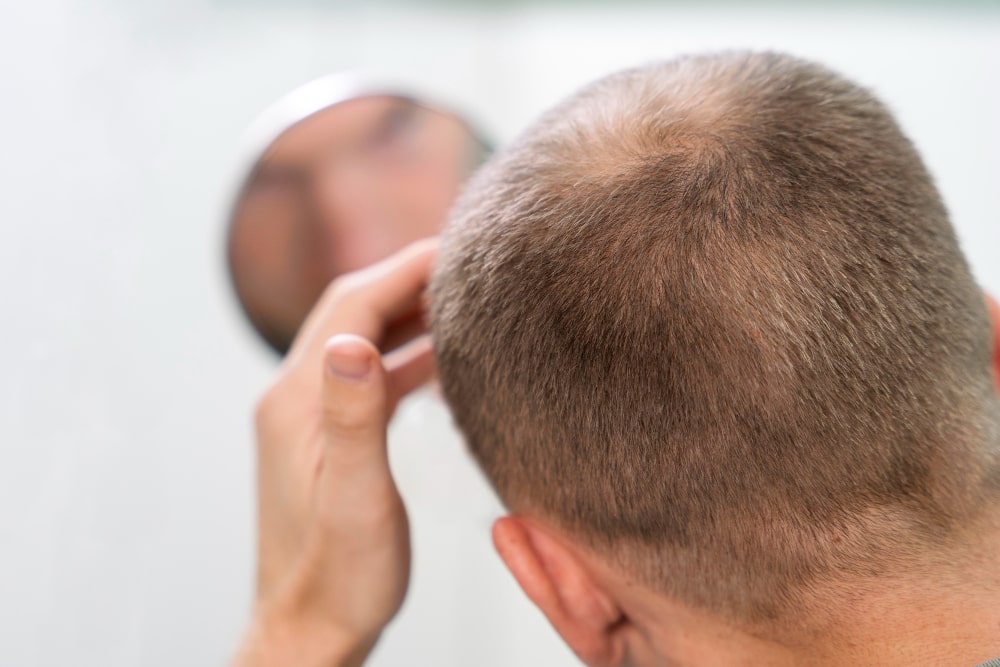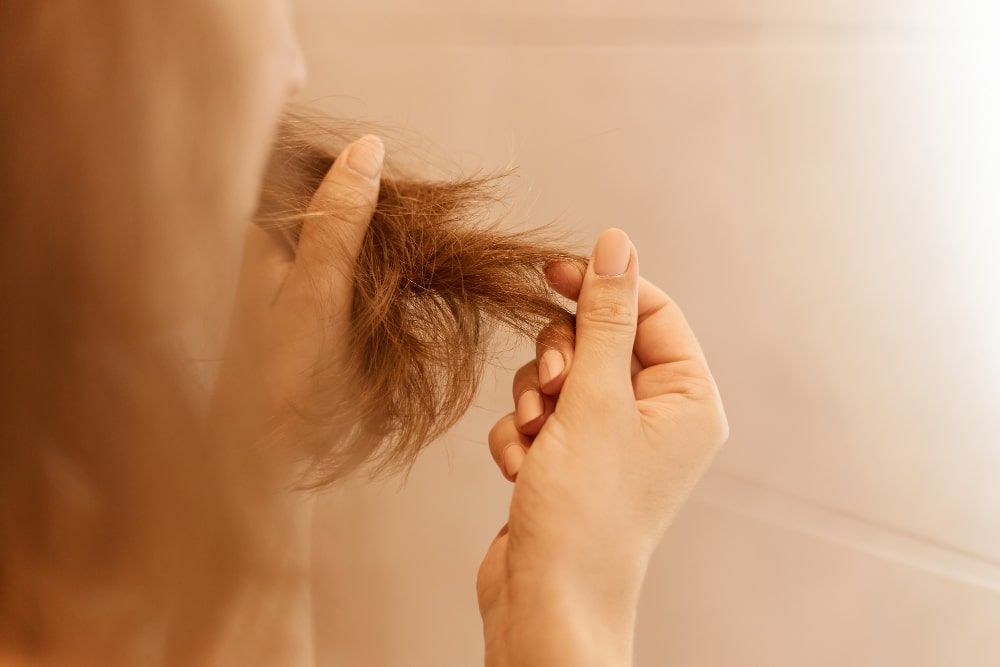Hair loss can be a daunting experience for any person, especially when trying to determine the root cause of your hair loss. For many people, it’s natural to assume that substances like alcohol could contribute to hair loss. But how much truth is there to this assumption? Is there evidence that drinking alcohol can directly cause hair loss or balding? In this article, we’ll look at the possible link between alcohol and hair loss, exploring whether drinking alcohol can directly cause alopecia or other forms of hair thinning.
Understanding Hair Loss
It’s important to first understand the potential causes of hair loss before attempting to discern if alcohol is a factor or not. Generally speaking, there are two primary types of hair loss: Androgenetic Alopecia (AGA) and Telogen Effluvium (TE). AGA is the most common form of hair loss, usually caused by heredity or hormonal fluctuations. TE, on the other hand, can trigger by stress, abrupt changes in diet or lifestyle, certain medications, or even physical trauma.
Read More: Does Lupus Cause Hair Loss? Everything You Need To Know
Alcohol’s Impact on the Body
Alcohol is a diuretic, meaning that it can cause dehydration and disrupt the body’s natural balance of hormones, leading to inflammation and hair loss. Additionally, alcohol has been known to be a depressant drug that negatively affects the immune system and its ability to fight off illness and infection, as well as process nutrients from food – all of which can contribute to the alcohol causing hair loss. Over time, this can lead to nutrient deficiencies, which can take a toll on the health of your hair.
Alcohol and Nutritional Deficiencies
When it comes to nutrition, too much alcohol can throw your body off balance. It can lead to the malabsorption of essential vitamins and minerals, including those important for hair growth, such as zinc, iron, Vitamin B12, and biotin. Mild to moderate alcohol intake can also reduce the bioavailability of Vitamin A, which is essential for healthy cells. All these deficiencies can lead to hair thinning and hair loss.
Hormonal Imbalances and Hair Loss
Alcohol consumption has been linked to hormonal imbalances in both men and women. For example, excessive alcohol consumption is known to disrupt testosterone levels, which can lead to male pattern balding. For women, too much alcohol can cause the body to produce more estrogen, which can lead to a higher level of androgens (male hormones) in the bloodstream. This can also contribute to hair loss.

Read More: Can Dry Scalp Cause Hair Loss? Everything You Need to Know
Dehydration and Hair Health
Dehydration is one of the most common side effects of alcohol consumption. When the body is dehydrated, it can’t properly produce sebum, a natural hair conditioner that keeps your scalp hydrated and healthy. Without this, hair follicles may become dry and brittle, leading to breakage or thinning.
Genetics and Alcohol Sensitivity
It’s important to note that not everyone is equally sensitive to alcohol. Those with a family history of hair loss or existing hair loss issues may be more prone to the effects of excessive drinking, as their bodies might lack the ability to process and metabolize alcohol efficiently.
How much alcohol is too much for hair health?
While moderate alcohol consumption isn’t likely to cause significant harm to hair health, it’s important to remember that too much alcohol can even cause hair loss. According to the Australian Department of Health, women should consume no more than two standard drinks per day, and men should limit themselves to four standard drinks in order to reduce the risk of long-term health issues.
Read More: Can Low Vitamin D Cause Hair Loss? How to Maintain Level
Healthy Habits for Hair Care
In addition to limiting your alcohol consumption, there are other steps you can take to ensure healthy hair. Eating a balanced diet full of vitamins and minerals is essential for overall health, including the health of your hair. Additionally, drink plenty of water throughout the day to keep your body hydrated, which can help improve circulation and promote hair growth.
Also, try to reduce stress wherever possible, as prolonged periods of stress can cause hair thinning and shedding. Finally, getting enough sleep is important for overall skin and hair health.
The Role of Diet and Hydration
It’s essential to maintain a healthy diet if you want to keep your hair looking and feeling its best. Eating foods rich in proteins, vitamins, minerals, iron, and zinc can help nourish your body. Additionally, ensuring enough water throughout the day can help promote healthy hair growth.
Alternative Factors in Hair Loss
While alcohol consumption is often linked to hair loss, it is not always the cause. Other factors, such as heredity, hormonal imbalances, medications, and physical trauma, can contribute to hair loss. If you suspect that alcohol or other factors may be contributing to your hair loss, it’s important to consult with a doctor or dermatologist for an accurate diagnosis and appropriate treatment plan.
Read More: Can Wearing a Hat Cause Hair Loss: Everything You Need to Know
Busting Myths about Hair Loss and Alcohol

The link between alcohol consumption and hair loss is often exaggerated, although it can be a contributing factor. While excessive drinking can contribute to various health issues, including hair loss, moderate drinking isn’t usually the cause for concern. Furthermore, it’s important to remember that many other factors can influence hair loss, ranging from heredity to diet and lifestyle choices. Therefore, it is important to understand that alcohol alone may not be the sole cause of hair loss but can contribute to it.
Conclusion
In conclusion, alcohol consumption can contribute to hair loss in certain circumstances, so the question of “does alcohol cause hair loss” is essential to consider. However, it is essential to remember that other factors can also play a role in hair thinning and balding. By understanding the potential causes of hair loss, avoiding excessive drinking, and maintaining healthy habits such as proper hydration and nutrition, you can help ensure the health of your hair. Many cases of hair loss can also treat with medical or surgical interventions, so it’s always best to consult a doctor if you are concerned about your hair loss.
Read More: Foods That Cause Hair Loss: Everything You Need to Know
FAQs
No, alcohol consumption is not directly responsible for hair loss. While excessive drinking can contribute to various health issues, including hair loss, moderate drinking isn’t usually a cause for concern. Many other factors can influence hair loss, ranging from heredity to diet and lifestyle choices.
Alcohol consumption can lead to malabsorption of essential vitamins and minerals, including those important for hair growth, such as zinc, iron, Vitamin B12, and biotin. These deficiencies can ultimately lead to hair thinning and hair loss.
Yes, genetics can play a role in how alcohol affects hair health. Those with a family history of hair loss or existing hair loss issues may be more prone to the effects of excessive drinking, as their bodies might lack the ability to process and metabolize alcohol efficiently.
It’s always best to consult a doctor or dermatologist if you are concerned about hair loss. Many hair loss cases can treat with medical or surgical interventions, so seeking professional advice is the best way to ensure proper treatment.

